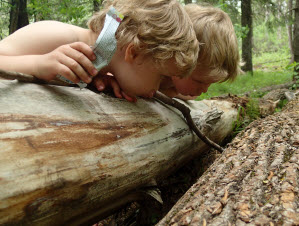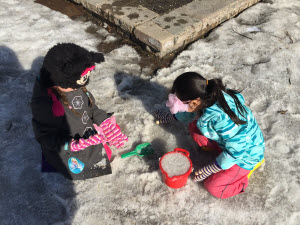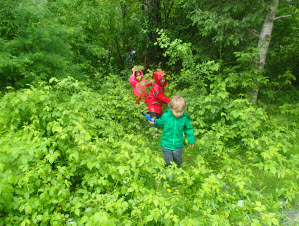Infant Curriculum Statement
Day Nursery Centre (DNC) provides care for infants in collaboration with parents to ensure that the transition from home to daycare is as smooth as possible. We strive to satisfy each infant’s need for a close physical and emotional attachment. We do this by holding, cuddling, interacting with them on the floor and being in close proximity to them at all times. As we forge this bond, we hope to become an extension of the family unit, working cooperatively to support both family and child. Parents are greeted each day and relevant information is exchanged. A daily record chart is used to further expand and strengthen communication between families and all caregivers in the Infant program.
DNC offers a child-centred, family-oriented Infant program designed to promote a developmentally appropriate approach to the social, emotional, physical and cognitive growth of each child. From a foundation of trust and security, caregivers encourage independence and experimentation. By arousing curiosity and interest, infants are motivated to engage in new challenges. These experiences stimulate the development of the “whole” child. The environment is designed to be a warm, safe, inviting and challenging space for the various stages of infants, and we continue to modify the space as each infant grows.
We use an Emergent Curriculum approach to planning with an individualized plan to meet the needs of each child. We believe and research shows that infants develop best when they are assured of having a trusted caregiver who can read their cues and respond to their needs. A primary caregiver is established when an infant starts the program and each staff is responsible for filling out daily charts and creating learning stories for the children in their group. A learning story is a descriptive “story” about a play experience that shows the developmental skills being gained and used in that example.
Our caregivers are educated and knowledgeable about child development and are able to read and respond to the infant’s needs and behaviours. The Infant Room has a scheduled routine to help children learn to understand the day and what comes next; however, this schedule is flexible and is adapted to meet the individual needs of each child.
Caregivers optimize learning opportunities in play experiences as well as daily care activities. For example in a play experience such as water play staff identify concepts such as full/empty or wet/dry and develop social skills among children by encouraging sharing and labelling what other children are doing and feeling.
Space and materials for caregiving routines such as diapering, dressing, hand washing, meal times etc. are set up and used to promote learning. An example of this is at diapering time, staff describe the steps they take to encourage language skills, label body parts and further develop the bond with the infant while engaged in one to one time. At the same time, the diaper change table is situated so that the staff can see the room while still spending 1-1 time with the child and involving them in the diapering routine. That individual time supports children’s positive emotional development.
At mealtimes caregivers create a relaxing and enjoyable environment, and are situated close to the infants to provide supervision and interaction, to foster relationships between the children and optimize teachable moments. Caregivers allow infants to explore their food, feed themselves and respond to hunger and fullness cues.
Language development is particularly crucial during the infant period. We provide many opportunities for infants to engage in meaningful dialogue. We acknowledge and encourage the infants’ forms of communication. We use and teach sign language at times which gives the nonverbal child the ability to communicate and helps to alleviate frustration while they are gaining their verbal skills.
Every infant will learn about their environment through exploration, at their own pace by touching, tasting, vocalizing and through their own play. Caregivers help to facilitate play by giving infants opportunities for play that is planned and spontaneous. An example of how staff helps children build relationships with each other is by assisting in turn-taking, role-playing and encouraging conversations with each other about what is happening.
Our caregivers meet regularly to discuss the environment, interactions and experiences as well as the interests and needs of each individual infant and the group. The indoor environment is set up to provide openly accessible space for children so that they can discover and learn by using hands-on materials in play with peers. For example, materials are arranged in open bins on low shelves. When planning, we consider all aspects of child development, the infants’ various cultures and diversity and incorporate it into their daily times of free play as well as regular transitions and routines of the day. Some ways that we do this are by displaying posters, photos, artwork and providing various play materials, and providing foods that are reflective of all different cultures and uniqueness of our children and their families as well as our staff. The learning environment includes sensory, literacy, curiosity, movement, music, and outdoor experiences. Our community is an extension of our program and we often journey out of the centre to play at local parks to explore and to learn more about the world around us.
The infant staff works closely with the preschool staff to help transition a confident, secure and happy child ready to embrace the next stage of Day Nursery Centre.



